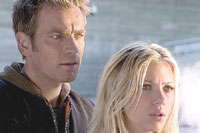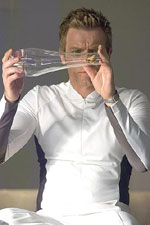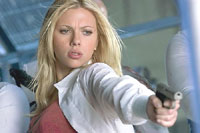The Island is a movie about clones, and so it comes as no surprise that the movie is, itself, something of a clone. But it is also something of a chimera; that is, it seems like the sort of movie you would get if you took pieces of two very different movies and squished them together, and the result is a monstrosity.
On the one hand, we have a dystopian science-fiction movie about people who live in an artificial environment under a totalitarian regime, oblivious to the fact that they are actually clones who have been manufactured as spare parts, or “insurance policies,” for the rich and famous of the world. The all-white production design and the theme of escape, as two clones try to break out of their world, brings George Lucas’s THX 1138 to mind; but the emphasis on genetic engineering and sterile perfection recalls Andrew Niccol’s Gattaca, and the way the creators of this society use comfort and fear to discourage curiosity about the outside world—all of the inhabitants believe they are survivors of a global catastrophe—recalls Peter Weir’s The Truman Show (also written by Niccol).
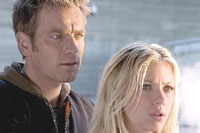
On the other hand, we have a standard-issue Michael Bay movie. Bay is the director of such crass, over-edited action movies as Armageddon, The Rock, and Pearl Harbor, and in The Island—the first film he has made without producer Jerry Bruckheimer—he steals more than one idea from his last film, the stupendously immoral Bad Boys II. In that movie, one chase scene featured Will Smith and Martin Lawrence dodging vehicles thrown off the back of a car carrier. This time, our heroes stow away on a similar truck and begin dumping heavy, massive train wheels off the back. Once again, the camera pivots around a door as heroes and villains approach it from opposite sides. And, once again, a scene gets its cheap punch line from some anonymous black person who barks something about Jesus.
The science-fiction part of the movie seems to be trying to say something significant about our society and its mad rush into technologies that we are not yet prepared to deal with ethically, especially where the creation of human life is concerned. (Does all this cloning have any bearing on the debate over embryonic stem-cell research? Discuss.) But the action-movie part of the film couldn’t care less about the deeper issues raised by the script. When two clones escape from the island and a corporate executive (Sean Bean) tells a team of ex-military mercenaries (led by Djimon Hounsou) to “contain” the situation, it’s just another excuse to pile on the car chases, the exploding airborne public-transit vehicles, and the extensive property damage. And if the film had any credibility before the scene in which two people survive a fall from near the top of a skyscraper, it stops right there.
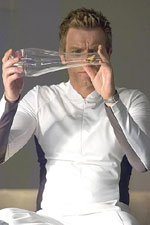
At the heart of all this are a handful of actors who have proved their worth in numerous other films, and who can therefore be forgiven for hopping aboard this roller-coaster. Ewan McGregor plays Lincoln Six-Echo, a clone with a slightly rebellious streak who is haunted by nightmares and a long list of unanswered questions; note how his first name alludes to the president who oversaw the emancipation of the slaves. Scarlett Johansson plays Jordan Two-Delta, the cute girl who slips him bacon strips when the food servers aren’t looking—apparently he isn’t supposed to eat them—and who would probably be his girlfriend if the security guards didn’t enforce the “proximity” rules. (The enforcement of this rule seems pretty selective, though, since the clones’ nightclub seems crowded enough.)
Lincoln’s curiosity about the outside world is fed by McCord (Steve Buscemi, stealing all his scenes as usual), a worker at the facility who slips him some contraband items and introduces him to concepts that have been kept out of his education, such as God. (“When you want something real bad and you close your eyes and ask for it, God’s the guy who ignores you,” says McCord.) One day, while visiting McCord’s office, Lincoln finds a moth that has infiltrated the facility through its ventilation system. The clones have been told that all moths were killed in a “contamination” that ravaged the world, but this sign of life from the outside convinces Lincoln to snoop around. And what he sees ain’t good.
The clones have been told that there is just one remaining natural “pathogen-free zone” in the world, a place that is called “the island”; and every now and then, a clone wins a “lottery” that supposedly sends him or her to this paradise. What the clones don’t know—and what Lincoln discovers, to his horror—is that “the island” is just a myth, and that the clones who win the “lottery” are actually taken to another part of the facility where they are, so to speak, “processed” like the mere “products” their creators believe them to be. Terrified, Lincoln and Jordan escape to the outside world, where they hope to expose what’s going on with McCord’s reluctant, minimal help.
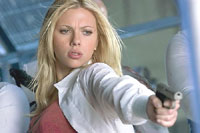
While some Christians might cheer the film’s demonization of scientists and others who play God and treat human life as just another form of animal or machine, etc., etc., the story also has Gnostic overtones that could be interpreted as critical of religion. Just as The Truman Show portrayed a God-like figure who tried to trap a soul within his artificial world by playing on his fears, so too The Island shows how the clones are fed false myths about the evil world outside and the imaginary paradise waiting for them. And just as films like Pleasantville have portrayed sexuality as a liberating force that allows people to break out of the perfect paradises created for them by God and men, The Island presents sexuality as the true fulfillment of the clones’ mythic desires, too. “The island is real,” says one clone to her partner after they experience the best sex two virgins have ever had. “It’s us.”
In fairness, the film’s mythic parallels become more complicated once the clones escape their world. One of the first creatures they encounter in the Arizona desert is a serpent—a rattlesnake, in fact—and the clones are simply too innocent to realize that it poses a danger to them. Similarly, sexual freedom has its limits; when Lincoln meets the man who had him cloned (also played by McGregor, who has a wonderful chemistry with himself), the original Lincoln says he has hepatitis, “a parting gift from God for all my philandering.” And the reason the clones exist in the first place, of course, is because the humans on the outside want to live forever, even if it means tampering with nature to do so.
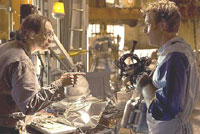
Whether these elements are signs of thematic complexity or just confusion on Bay’s part is an interesting question. Certainly the film has other problems that make you want to scratch your head, like the brand-name sneakers worn by the clones (no environment is so pure or sterile that you can’t put a product placement in there!), or the way some of the clones—who, if I heard this correctly, are built from their sponsors’ DNA, with memories programmed separately—somehow inherit their sponsors’ memories, too.
And ultimately, whatever message the film might have had is ultimately drowned out by the violence—which, incidentally, is a little more difficult to follow here than in Bay’s other films, partly because the futuristic machines he destroys are not as familiar to the audience as the national monuments that were featured in some of his other movies. The film itself remains a patchwork of clichés—evil corporations, evil Frankenstein-like scientists, and so forth—which is the one kind of cloning that Hollywood does accept.
Talk About It
Discussion starters- Do you think this movie has anything to say about current debates concerning genetic and biological engineering? If so, what? Does it favor one side over another?
- Dr. Merrick (Sean Bean), the scientist in charge of the island, says the clones have no souls. Do you agree or disagree? Does it make any difference that the clones were not conceived or born the natural way?
- Dr. Merrick compares the human body to a machine that “wears out.” How have the scientific developments of the past century or two encouraged us to look at ourselves this way? Are bodies just collections of “parts”? How do we understand our bodies in the light of God’s creation, and in the light of the Incarnation and Resurrection? (See 1 Cor. 15:35-49.)
- How does the community in which the clones live resemble other communities in our world? What sorts of lies do we hear, if any, in the media (including movies)? In schools? In churches? How do these venues play on our fears and our desires?
- What do you make of the film’s references to God? McCord says God doesn’t hear us when we pray, while the original Lincoln says, presumably insincerely, that his disease is a punishment for his sexual promiscuity. (Note also McCord’s line about being “the guy who tells the kids there’s no Santa Claus.”) Is there any sign in this film that God does more than ignore and punish us? What do you make of the film’s use of snakes, light, crumbling angelic sculptures, and other visual motifs that have high symbolic value?
The Family Corner
For parents to considerThe Island is rated PG-13 for intense sequences of violence and action, some sexuality and language. The violence includes scenes of hooks being shot into people’s legs, a man’s hand being nailed to a door, armored trucks performing somersaults in crowded roads, and various other scenes of things and people being shot and blown up. In addition, we see the clones grown and killed at various stages of biological development. The script also contains jokes that could be construed to be at the expense of women, gays, and Christians.
Photos © Copyright DreamWorks SKG
Copyright © 2005 Christianity Today. Click for reprint information.
What Other Critics Are Saying
compiled by Jeffrey Overstreetfrom Film Forum, 07/28/05If you enjoy good science fiction, intriguing ethical questions about science and power, adrenalin-rush action, suspense, and dazzling special effects, here are several worthwhile movies that offer such a variety: THX 1138, A.I. (Artificial Intelligence), Minority Report, Star Wars: Episode Two—Attack of the Clones, The Matrix, The Truman Show, Coma, and Gattaca.
If you’d prefer to see a film that borrows most of its ideas from better movies and slaps them together into something that insults your intelligence, rattles your senses, and wastes your time, go see The Island.
Michael Bay’s latest barrage of explosions seems to leave gaping holes in the film’s plot. The Island stars Ewan McGregor (Obi-Wan of the Star Wars prequels) and Scarlett Johansson (Lost in Translation) as clones, living in a clone society, oblivious to their origins or their purpose. They’re walking, talking “insurance policies” waiting to have their organs harvested for the benefit of their “originals.”
The “originals” are rich investors who believe they’re investing in non-sentient tissue development. If they were to find out that their money is funding a whole society of expendable human beings, they would cause a fuss. So the clone-making company does what it can to keep its child-like residents and its investors happy and oblivious to the truth. (The Lord of the Rings’ Sean Bean plays the nefarious genius in charge of this misguided operation.)
Bay and Company seem to think they’re wrestling with tough ethical questions. And the film does carry echoes of the debates over stem-cell research and abortion. Thus, viewers might find themselves in some worthwhile conversation after the credits roll. But this exploration is no more provocative than Soylent Green’s Charlton Heston running around in a panic, shouting, “Your insurance policies are PEOPLE!!!” We end up watching five very fine actors—McGregor, Johansson, Bean, Steve Buscemi (Ghost World), and Djimon Hounsou (In America)—waste their formidable talents on a ridiculous and forgettable motion picture. (The film’s plot is apparently almost identical to that of an older B-movie called Clonus, and the resemblance is causing a stir. If they had to steal a story, why not steal a good one?)
My full review is at Looking Closer.
Other Christian film critics wish they could have voted these filmmakers off The Island.
Steven D. Greydanus (Decent Films) says, ever so carefully, “The Island is the closest thing so far to a good Michael Bay film. Damning with faint praise, yes—but bear in mind that most of Bay’s filmography to date … deserves to be damned with loud damns. So let me repeat: The Island is Bay’s best film to date, and Bay’s best effort to date at a meaningful, thoughtful film.”
Tom Neven (Plugged In) says, “The stunts are so extreme and over-the-top you just can’t suspend disbelief for long enough chunks of time to enjoy them. Granted, it’s more serious than your typical Bay movie, but that does little more than call unwarranted attention to the story’s inadequacies. So with no compelling reason to dwell on the main text or the subtext, pretty much all you’re left with is lots and lots of chase scenes and explosions, a few fistfights and smatterings of vulgarity.”
Christian Hamaker (Crosswalk) writes, “The shift to … by-the-numbers action-film clichés pushes into the background the film’s earlier questions about the purpose and meaning of life, providing a too-tidy resolution that leaves viewers superficially sated. While The Island deserves credit for addressing the downside of our culture’s obsession with ‘quality of life’ at all costs, its insistence on raising the bar for sheer summer-movie spectacle ultimately wins out, and disappoints.”
Offering the only complimentary review, Harry Forbes (Catholic News Service) writes, “Bay’s action-packed thriller … has the usual (and regrettable) mind-numbing explosions and car crashes, through admittedly deftly executed. … Production designer Nigel Phelps has succeeded in creating a convincing futuristic environment, and the overall look of the film is striking. … The film is rife with moral considerations … and conveys a positive overall message about the sanctity of life and, of course, though hardly a serious treatise on the subject, paints a frightening picture of the consequences of cloning, making this a good cautionary tale.”
Mainstream critics agree that the film requires you to turn your brain off. A few of them find it’s an acceptable entry in the “mindless fun” category.
from Film Forum, 08/04/05Gene Edward Veith (World) says, “Whether its message comes from the views of the filmmakers—the action-movie director Michael Bay and writer Caspian Tredwell-Owen—or whether it just emerges logically from the movie’s premise, The Island packs a powerful pro-life punch … [and] makes an important imaginative contribution to the current debates, reminding us that clones are not monsters. The monsters are the people who do the cloning and those who are willing to destroy life just to enhance their own.”
Peter Suderman (Relevant) says “the plot, such as it is, is ancillary to Bay’s destructive impulses; story points exist only to move the characters from one rollicking set piece to another. You get the feeling that if the film could inject action scenes intravenously, it would. It’s not so much a movie as an action-scene delivery system.”
Denny Wayman and Hal Conklin (Cinema in Focus) compare the scientists of this film to King Herod, who killed infants to protect his throne; and they conclude, “Whether terminating the lives of cloned women who give birth for adoptive parents or placing in gas chambers those clones whose curiosity makes them impossible to manipulate, this film presents the reality that such control over others’ is murder.”

